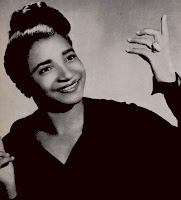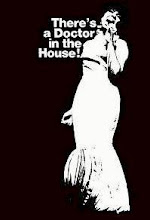mid-week gospel
She was very classy and wanted to become a Billie Holiday type of pop singer. But she met Willie Mae Ford Smith and that changed everything
(J. Lowe)
I must say Madame Edna Gallmon Cooke was one of the most devoted, religious artists I ever encountered. Very few that I ever found were really true, and as the gospel song says, "I'm Gonna Live the Life I Sing About." Edna would go into the studio, and while the musicians were rehearsing or there was time out, she would be reading the Bible and praying. She was the only one I ever knew that did that
(Nashboro's Shannon Williams)
I think she and Mom liked the same preacher
(Clara Ward)
Bessie Griffin, for example, was very underrated; ... Edna Gallmon Cooke was unique. These were ladies who sang with every fiber in their being. These were the exponents of what I now call traditional gospel. Stick-to-your-ribs gospel
(Aretha Franklin)
One of the smoothest, jazziest of church singers
(Bil Carpenter)*
She has many fans, and many singers considered her an example to follow. Yet her name does not ring out like those of, say, Clara Ward or Mahalia Jackson. (Bil Carpenter quotes the dry remark by J. Lowe that »just as Mahalia was the biggest soloist for the white audience, Madame was the biggest star for the black world« - Uncloudy Days, p. 102). I am speaking of Edna Gallmon Cooke, known in her early days as »Sweetheart of the Potomac« and reportedly given the honorific epithet »Madame« by the Holiness Church. You'll find some info about her life and career scattered over the literature and the net but she hasn't received substantial treatment yet (see also below); the best, and most sympathetic, account of Edna Gallmon (»Cooke« was actually the name of her first husband) offers Bil Carpenter's Uncloudy Days (p. 101 f.).
Madame Edna was, together with Martha Bass and Joe May, one of the protégés of known singer Willie Mae Ford Smith (1904-94). (You can hear them all on the LP Mother Smith and Her Children.) She started recording in 1949 and from 1952 onwards (and until her untimely death in 1967) was under contract to Nashboro, quickly becoming one of the biggest stars of the label. Legend has it, and it is most probably true, that she switched to »talk-chanting« when she felt that her fragile soprano voice couldn't match the forceful style of deep-voiced Sister Smith. The sermonette-style, adapted from her father Eddie J. Gallmon's preaching, then became her trademark; it was described as »semi-recitative style« (in a BB review from Nov. '58) and some saw her as a progenitor of modern rap, others called her
»a transcendent moaner«. Apart from that, her penchant for »note-bending« or melisma was most often noted, and justly so.
You'll hear all of this clearly on Nashboro # 705, released in late autumn 1961 (the 45 is reported as new release in a mid-November Billboard issue). This single contains one of Edna's most famous songs, »Stop Gambler« (which also provided the title for her 1961 Nashboro LP # 7009). This curious song has often been remarked upon: It roughly falls in two parts (separated by the dramatic sound of lightning!), the first introducing the scene (the soldiers sitting at the foot of the cross and gambling for Jesus's coat) and the second counting down the cards and linking them to Christian motifs. (On the Stepfather of Soul's blogspot I read that Edna in this song »took T. Texas Tyler's "Deck of Cards," stripped it of its original story and went straight to the cross of Calvary to discuss Christ's crucifixion«.) The song ends with the message Stop right now, gambler! I wouldn't use those cards anymore! and has shook many into abandoning gambling. Accompanied by an organ, Edna talks herself through that remarkable sermonette. Horace Boyer felt that Edna in this song »dis- cusses the gamble in the contemporary parlance of a radio sports announcer and begins the countdown from the deuce to the ace like someone familiar with casinos«
(The Golden Age of Gospel, p. 238).
Edna Gallmon Cooke: »Stop Gambler« on Nashboro # 705 (1961):
* * *
* * *
*Sources for the introductory quotations: (1) J. Lowe's (who was one of the male background singers on many of Edna's recordings) quote from Bil Carpenter's Uncloudy Days, p. 101. (2) Shannon Williams's quote from John Broven: Record Makers and Breakers: Voices of the Independent Rock 'n' Roll Pioneers, Urbana 2009, p. 110. (3) Clara Ward's quote from Willa Ward-Royster's How I Got Over, p. 192. (4) Aretha's quote from Aretha Franklin and David Ritz: From These Roots, New York 1999, p. 77. (5) Bil Carpenter's quote from his Uncloudy Days, p. 101.















No comments:
Post a Comment